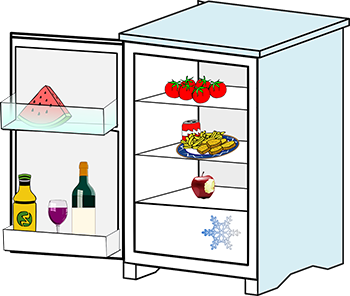Energy - How to make your home more energy efficient
Some tips for saving energy!
Cooking..
- Use an electric kettle to boil water for cooking instead of using the hob.
- Don't overfill your kettle - only boil as much water as you need.
- Use a toaster instead of a grill.
- Choose gas ovens and cookers over electric.
- Avoid using the oven to cook one dish – bake a few things at one time.
- Cook with lids on the pans.
- Use pressure cookers and microwave ovens whenever it is convenient to do so. They can save energy by significantly reducing cooking time. Boil water in the kettle for cooking rather than heating it up in the pan.
- Match the size of the pan with the size of the heating element.
Refrigerators

- Make sure your fridge door seals are airtight.
- Don't keep the fridge door open for longer than necessary.
- Cover liquids and wrap foods stored in the refrigerator. Uncovered foods release moisture and make the compressor work harder.
- When buying a fridge be sure to buy a high efficiency refrigerator.
- Size doesn’t matter! Remarkably, energy consumption by the most efficient refrigerator models is largely unrelated to their size.
- Avoid refrigerators with a built-in frozen food compartment, if you have a separate freezer. These models are less efficient and you lose cooling space.
- Place fridges and freezers in the coolest area possible.
- It is best to always keep the fridge and freezer full; (newspapers or plastic bags will suffice to pack that freezer!). The less space available for cold air inside, the less cold air can escape when the door is opened.
- Do not place anything hot inside - as there is more energy required to cool it.
- Keep your fridge/freezer at the right temperature (2-3° C for a fridge and -15° C for a freezer), and make sure the door seal works properly.
- Allow air to circulate behind your fridge and clean 'fuzz' off the piping at the back.
Freezers
- For most home consumers it is better to buy a two door refrigerator/freezer combination with separate compartments, than a separate refrigerator and freezer.
- Chest type models are more efficient than uprights.
- Unlike refrigerators, with freezers size does matter. Larger freezers do need more electricity. So don't buy a freezer that is larger than you need, especially if you live close to your local supermarket.
- Check local stores or online for the most current efficient models.
Washing machines
- Buy a high-efficiency model with low power consumption.
- If you will be using a clothes dryer to dry your clothes, make sure that your washing machine can spin at 1600 or even 1800 rpm.
- Remember water! Check the water efficiency of the model.
- Consider a 'hot fill' model which connects directly to your efficient gas-fired water heater.
- Using gas to heat the water almost halves electricity consumption. Installing a hot fill appliance needs to be done correctly, so good advice is required.
- Run the washing machine with full loads as it is more energy and water efficient.
- Jet spray type washing machines use less water and therefore less electricity to heat.
- Use low temperature washes whenever possible.
- Always check local stores or online for the most current efficient models.
Clothes dryers
- Consider drying the natural way (i.e. on a clothes horse indoors or a line outdoors) if practical.
- If natural drying is not an option, first make sure that your washing machine can spin at 1600 or even 1800 rpm. This will reduce the energy needed for drying.
- There are two clothes-drying technologies that use far less energy: the gas-fired clothes dryer and the dryer with an electric heat pump. The gas-fired dryer is the best alternative, especially for more intensive use: it uses 60 percent less energy (including the gas) and dries 40 percent faster. If gas is not available, consider a dryer with a heat pump. A heat pump dryer will use half the electricity of a traditional dryer. However, heat pumps can be rather expensive.
- So-called 'condensation' models – without an exhaust tube – use even more energy.
Dishwashers
- Buy a high-efficiency model with low power consumption.
- Consider a 'hot fill' model which connects directly to your efficient gas fired hot water heater. That way, gas is used to heat the water instead of electricity, thereby reducing electricity consumption by 50 percent, or even up to 90 percent for the top models. This is because gas is almost twice as efficient for heating water as electricity. Note that installing a 'hot fill' needs to be done properly so good advice is required.
- Remember water! Check the water efficiency of the model.
- Run the dishwasher with full loads as it is more energy and water efficient.
- Use eco setting whenever possible.
- Always check local stores or online for the most current efficient models.